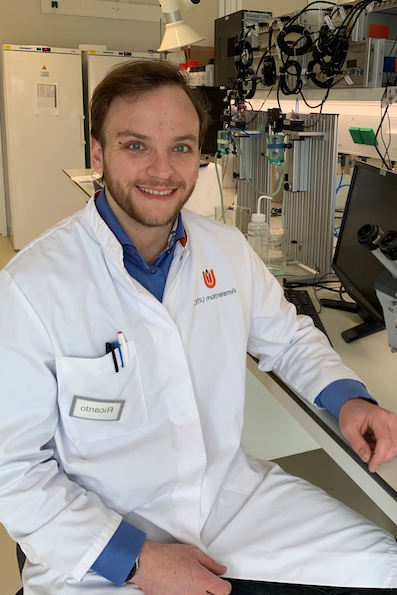One of the key reasons Ricardo chose the VU’s Research Master’s programme in Human Movement Sciences was the opportunity it gave him to do a one-year research internship. “I already knew I liked research,” he explains, “but I wanted to get a taste of PhD life – to see whether I wanted to commit to a four-year programme and to get the knowledge and tools to apply. I’d really recommend it if you’re considering an academic career, because your research internship basically acts as your CV when applying for a position.”
A taste of PhD life
In Ricardo’s case, he was drawn to the VU’s Research Master’s programme because of how well funded research is in Amsterdam, and how the broad programme spans everything from computational biomechanics to molecular biology in ageing and disease. But no less importantly, he credits Prof. Richard Jaspers, Director of Amsterdam Movement Sciences, for his inspiration. “His lectures on the molecular physiology of muscles and what happens at the cellular level of disease really got to me,” says Ricardo, “so I decided to do my internship with him at the VU’s Myology Laboratory. At the end of the internship, he put me in touch with Prof. Coen Ottenheijm from Amsterdam UMC, who had a grant for a project that really interested me. And that’s how I ended up where I am now.”
Cutting-edge research
In the Department of Physiology at Amsterdam UMC, Ricardo is responsible for researching muscle congenital myopathies – or muscular dystrophy, in layman’s terms. “We research very rare muscle myopathies where distinct mutations in muscle cell proteins result in disease in humans. We develop specific tools to understand how the disease develops over time and affects the patient. Once we understand the underlying mechanisms, we can develop therapeutic targets to treat the disease.”
No two days are the same in the lab: “I hate routine and this job is the complete opposite. One day I’ll be doing animal work; the next I’ll be in a different lab working with cells or imaging under the microscope. I also get to travel a lot to collaborate with researchers in other countries. I’m lucky to meet and learn from a lot of people. There’s no one telling me what to do – I have to propose my own ideas and then go after them.”
Programme pros and cons
Based on Ricardo’s career so far, it’s clear that he benefited from the personal attention of the university’s professors. “There were only 14 people on the programme in my year, so there was a very personalised approach,” he says. But there are other benefits to the Research Master’s as well: “Doing a year-long internship means you have the time to develop real ownership over your research. And during that time, you’ll learn not just academic skills but also professional skills. However, bear in mind it’s not cheap! I worked my way through the programme as a bike repairman on evenings and weekends, but it was really tough to do both. Financial support is crucial.”
